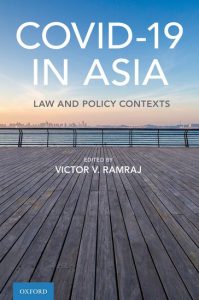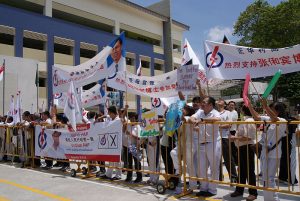Meet Our SPPGA Directors – Professor Kai Ostwald
In this interview with SPPGA, Professor and Director of the Institute of Asian Research Kai Ostwald sits down to talk with us about his expertise in development, public policy, and ethnic politics with a strong focus is Southeast Asia, and his leadership of the Institute of Asian Research.
COVID-19 in Myanmar
With modest COVID-19 numbers in mid-2020, a few months turned Myanmar into one of Southeast Asia’s infection hotspots. Professor Kai Ostwald (SPPGA & Political Science) delves into the country’s distinct pandemic challenges—and why it is especially vulnerable.
The Singapore PAP’s Waning Dominance
Professor Kai Ostwald (SPPGA & UBC Political Science) examines the dwindling dominance of PAP, increased representation of female and ethnic minority members, and the long-term implications of the PAP’s vision. Read more at East Asia Forum.
Malapportionment in Myanmar’s Elections: A Slumbering Menace
“Myanmar’s use of colonial-era administrative boundaries as the basis for electoral constituencies creates a staggering degree of malapportionment that meets or exceeds the world’s highest levels,” Professor Kai Ostwald (SPPGA & Political Science) and UBC PhD student Constant Courtin state in ISEAS – Yusof Ishak Institute (ISEAS).
Malaysian Politics Under the New Perikatan Nasional Government
Under the new Perikatan Nasional (PN) government led by Prime Minister Muhyiddin Yassin, concerns around Malaysia’s political and economic future have sparked a series of conversations. Professor Kai Ostwald (SPPGA; Political Science) is featured in an interview by The Diplomat, in which he shares his insights on Malaysia’s sociopolitical and economic trajectories following the collapse of the Pakatan Harapan (PH) government, and on the challenges faced by the country in light of the COVID-19 outbreak.
Malaysia 2020: The Impasse of Two-Coalition Politics
In the dawn of a new political era, Malaysia transitions into an unprecedented non-UMNO government under a de facto two-coalition system. Professor Kai Ostwald (SPPGA; Political Science) puts the country’s new governmental structure under analytical scrutiny, examining its viability as a governing entity as well as the sociopolitical and economical complications of Malaysia’s current impasse in its politics.
As Dust Settles in Malaysia, Muhyiddin Yassin Must Work to Instill Public Confidence
Following Malaysia’s unprecedented transition into a non-UMNO government, the new Prime Minister Muhyiddin Yassin and his administration faces hurdles with instilling of public confidence . In an article by South China Morning Post, Professor Kai Ostwald (SPPGA; Political Science) comments on the effectiveness of the Malay-unity composition as a governing entity given the country’s history.
Malaysia Finds a Polarized Place in the Trump-Brexit World
“One Malaysia for whom?” Utilizing research co-written by Assistant Professor Kai Ostwald, SPPGA and UBC Political Science, an article with Bloomberg Opinion highlights the complexity of Malaysia’s national politics due to rising geographic, cultural and economic divisions.
Electoral Boundaries In Malaysia’s 2018 Election: Malapportionment, Gerrymandering And UMNO’s Fall
In his article “Electoral Boundaries In Malaysia’s 2018 Election”, Professor Kai Ostwald (SPPGA; UBC Political Science) delineates the fall of UMNO through a close examination of the political context, providing an overview of the role electoral boundaries played in GE 14.
Four Arenas: Malaysia’s 2018 Election, Reform, And Democratization
In co-authorship with Steven Olivier, Professor Kai Ostwald (SPPGA; UBC Political Science) sheds light on the political dynamics in Malaysia following the 2018 elections that ended the six-decade-long dominant party rule by the United Malays National Organisation (UMNO).
New Virus Could Disrupt Global Economy As Markets, Consumers Change Behaviour
SPPGA Assistant Professor Kai Ostwald is cited in a TriCity story on the global unrest sparked by the novel coronavirus. Parallels have been drawn with the 2003 SARS outbreak in which fear-based shifts in consumer behavior due to a ‘fear of contagion’ was the main cause of economic damage.
Power Distribution and Decentralisation in New Malaysia
SPPGA Professor Kai Ostwald just published a memo on power distribution and decentralization in Malaysia under Pakatan Harapan. Access the memo at ResearchGate.
Personal Feud Turns Public as Singapore PM’s Brother Backs Opposition
As family feuds enter national politics ahead of Singapore’s general elections, SPPGA Professor Kai Ostwald was quoted in an article about regional and global factors that may pose a threat to the PAP party, who have been in power since 1959.
Minorities Matter: Malaysian Politics and People
SPPGA Professor Kai Ostwald’s chapter in “Minorities Matter: Malaysian Politics and People,” covers local elections, decentralization, and institutional reform in the aftermath of the 2018 Malaysian federal elections.
Can a New Political Party Shake Things Up in Singapore?
In Singapore, Tan Cheng Bock’s new political party could pose a threat to the People Action Party, which has been in power for much of the country’s history. SPPGA Professor Kai Ostwald evaluates whether this new party is what Singapore’s opposition needs in the World Politics Review.
Rematch: Islamic Politics, Mobilisation, and the Indonesian Presidential Election
Conservative segments in Indonesia have mobilized to garner more support in the 2019 election. Observers should expect significant changes. SPPGA Professor Kai Ostwald discusses why the country’s Islamic vote has previously been under-mobilized.
Connecting Myanmar Researchers to Canadian Universities
UBC and Yangon University of Economics, Myanmar signed a memorandum of understanding that solidified their collaboration in support of evidence-based policy development in Myanmar. UBC was represented by SPPGA Professor Kai Ostwald at the signing.
Triple Duel: The Impact of Coalition Fragmentation and Three-Corner Fights on the 2018 Malaysian Election
SPPGA Professor Kai Ostwald, co-authors Paul Schuler and Jie Ming Chong investigate the Barisan Nasional (BN) government ‘s defeat in the 2018 Malaysian election in the Journal of Current Southeast Asian Affairs.
Ethnic Diversity Matters for Decentralisation and Development
As Myanmar and Malaysia look to Indonesia to consider decentralization for their own nations, SPPGA Professor Kai Ostwald & others highlight the importance of ethnic diversity and segregation for development in a piece for East Asia Forum.
Explaining elections in Singapore: Dominant party resilience and valence politics
Cambridge University Press | July 11, 2018 | Co-written by: Dr. Kai Ostwald
Efforts of the Opposition Party in the Coming Malaysian Election
Professor Kai Ostwald commented on the coming elections in Malaysia. Ostwald specifies the necessity for a surge in Malaysian voters for the opposition to secure a win.
Malaysia’s Election Is a Strange Brew of ‘Fake News,’ Cambridge Analytica and a 92-Year-Old Autocrat-Turned-Reformer
L.A. Times | May 7, 2018 | Featuring: Dr. Kai Ostwald
Ethnic Segregation and Public Goods: Evidence from Indonesia
MPPGA Professor Kai Ostwald co-authored an article on how ethnic segregation affects public goods provision in Cambridge University Press.
Centralisation not reconciliation under Najib Razak
MPPGA Professor Kai Ostwald article on the 2018 Malaysian Elections season via East Asia Forum. The competitive nature of the last two general elections has fuelled widespread speculation about the possible defeat of the United Malays National Organisation (UMNO) for the first time in the country’s post-independence history.
Malaysia Ranked Near Bottom in Study on Electoral Integrity
Today Malaysia | Dec 2, 2017 | Featuring: Dr. Kai Ostwald
Legitimacy and Longevity in Singapore’s Reserved Presidency
Professor Kai Ostwald co-authored “Legitimacy and longevity in Singapore’s reserved presidency” of the People’s Action Party (PAP) long-term staying power. While Singapore’s reserved presidency aims to ensure minority candidates are represented, it may be out of step with what voters actually desire.
Malaysia’s Electoral Process: The Methods and Costs of Perpetuating UMNO Rule
Professor Kai Ostwald evaluates Malasya’s electoral process. His analysis asseses the excessively manipulated electoral process, juxtaposed against its successful developmental record and relative social stability.
Volume: Southeast Asia in an Evolving Global Landscape: Prospects for an Integrated Region and Implications for Canada.
An edited volume with contributions from Professors Kai Ostwald, Paul Evans, and others emerged from a conference on held by Global Affairs Canada entitled Southeast Asia in an Evolving Global Landscape: Prospects for an Integrated Region and Implications for Canada in Ottawa on May 30, 2017. As Canada and ASEAN celebrate 40 years of dialogue partnership, which coincides with the golden jubilee of the grouping itself, there is growing momentum to bring the relationship to the next level.
Southeast Asia in an Evolving Global Landscape: Prospects for an Integrated Region and Implications for Canada.
Southeast Asia in an Evolving Global Landscape: Prospects for an Integrated Region and Implications for Canada. Canada has signalled its intention to comprehensively re-engage the Asia-Pacific region and reclaim its own position as a Pacific nation. Southeast Asia is a vital part of this strategy. As Canada and ASEAN celebrate 40 years of dialogue partnership, […]
Kai Ostwald wins Best Paper Award from the American Political Science Association – Southeast Asia Politics Group
The SPPGA is pleased to congratulate Dr. Kai Ostwald for winning the Best Paper Award from the American Political Science Association – Southeast Asia Politics Group. His paper “Explaining Elections in Singapore: Party Credibility and Valence Politics,” written with Dr. Steven Oliver, makes an important contribution to the existing scholarly literature by explaining party durability in Singapore. The award […]
Why Geography Is Undermining Democracy Around the World
The Atlantic | Jan 4, 2017 | Featuring: Dr. Kai Ostwald
Indonesia’s Decentralization Experiment: Motivations, Successes, and Unintended Consequences
Journal of Southeast Asian Economies | Aug 2016 | Written by: Dr. Kai Ostwald (co-authored with Yuhki Tajima and Krislert Samphantharak)
Delayed Transition: The End of Consensus Leadership in Vietnam?
Nguyen Tan Dung is viewed as the frontrunner to be the general secretary of the Vietnam Communist Party. In this report published in the Institute of South East Asian Studies (ISEAS) Perspective, MPPGA Faculty Kai Ostwald provides reasons why it is highly unlikely that he will get enough party support for his general secretary candidacy.







